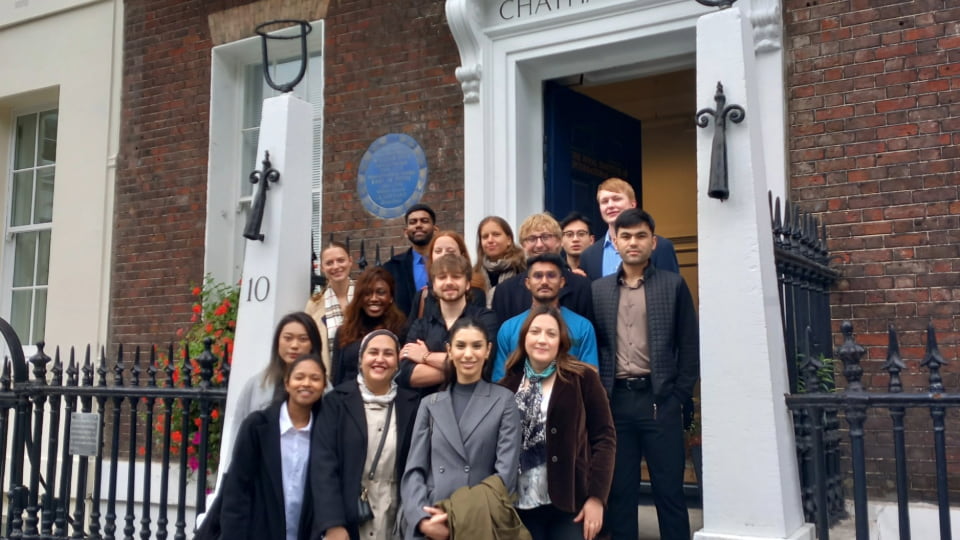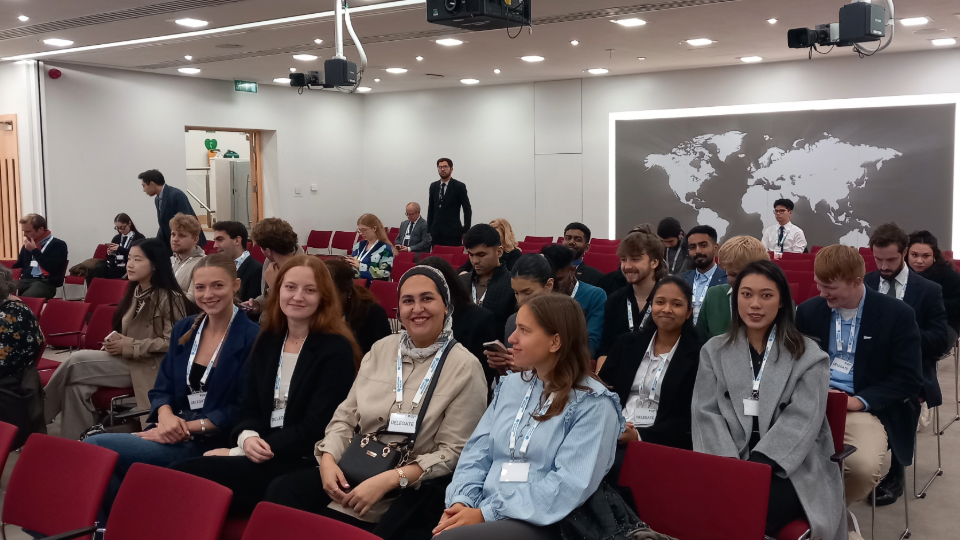Will Iran Rearm or Reform? IDIA Students Explore Regional Diplomacy at Chatham House

By: K. Rashane Jude Pintoe Studying for MSc Security, Peace-building and Development
At the Institute for Diplomacy and International Affairs (IDIA), students are regularly given relevant and practical exposure to topics surrounding diplomacy, crises and security, as part of their flagship Inside the Profession Series of Events.
On 14 October 2025, students from IDIA attended a timely and thought-provoking event at Chatham House titled ‘Will Iran Rearm or Reform? War, Nuclear Standoff, and Shaken Alliances’. The discussion brought together leading experts on the Middle East and Iranian politics, including Professor Vali Nasr, Dr Sanam Vakil, and Dr Marion Messmer, and was chaired by Financial Times journalist Andrew England.
The event came at a critical moment in regional geopolitics. Just months after the US strikes on Iran’s nuclear sites in June 2025 and the subsequent peace agreement between Israel and Hamas in Gaza brokered by President Trump, questions continue to mount about Iran’s next move – will the Islamic Republic seek to re-establish deterrence through rearmament, or will it reform internally to consolidate stability?
For IDIA students, especially those currently taking the module ‘Diplomacy in the Digital World’ taught by Dr. Tatevik Mnatsakanyan, the event offered an opportunity to engage directly with these unfolding debates. It also provided a vivid example of how academic study connects with real-world diplomatic challenges.
Professor Vali Nasr, an Iran expert and Majid Khaddouri Professor at Johns Hopkins University, opened with a sobering assessment of Iran’s position in the aftermath of the strikes. Despite Washington’s claims that Tehran’s nuclear capacity had been permanently degraded, Professor Nasr argued that ‘Iran does not see itself as defeated’. Instead, he suggested, the leadership seeks to ‘restore a balance of power and deterrence with Israel’. His remarks underscored a broader point about the limits of coercive diplomacy, namely how military strikes may delay nuclear progress, but they rarely alter strategic intent.
Dr. Sanam Vakil of Chatham House’s Middle East and North Africa Programme reflected on the internal calculations driving Iran’s foreign policy. She noted that Supreme Leader Ali Khamenei faces a dangerous balance, namely on maintaining regime legitimacy, shaping his legacy, and preparing for succession – all amid economic strain and social discontent. This discussion resonated strongly with students examining how domestic politics intersect with international positioning of world leaders and political parties.
The speakers also addressed the fragmentation of Iran’s regional influence. As Dr. Marion Messmer observed, Tehran’s so-called Axis of Resistance, stretching from Hezbollah in Lebanon to Hamas in Gaza, has faced significant setbacks. The weakening of allies such as the al-Assad regime in Syria and the strain on Hezbollah’s military capacity have eroded Iran’s defensive buffer, challenging its long-standing strategy of deterrence through proxies, thus making them defend themselves in their own land.
Equally intriguing was the conversation about Iran’s evolving domestic policy. Professor Nasr pointed to a subtle shift toward pragmatism in social governance, speaking for example on the hijab issue, which he said is no longer as strict as it used to be. With the regime prioritising survival over ideological rigidity, authorities appear less inclined to provoke major uprisings through strict enforcement. This dynamic, he suggested, reflects a broader recalibration within the Islamic Republic – one that seeks to preserve stability even as its ideological core remains intact.
Reflections: Learning Beyond the Classroom

Students found the session both intellectually stimulating and professionally enriching. One student, Sirojiddin Gulomov, reflected:
‘We received really valuable data from scholars about Iran – about its geopolitical position, domestic challenges and its evolving relations with regional and global powers’.
Celine Erciyas added: ‘As a Master’s student in Diplomacy and Sport, I really appreciated attending the Chatham House conference: Will Iran Rearm or Reform? I learned a lot about Iran’s current political situation. The discussion made it clear that lasting peace in the Middle East is impossible without an agreement with Iran. I also found the insights on Iran’s growing ties with Russia and China particularly interesting, as they show how Tehran is adapting to Western pressure and reshaping its alliances. Overall, it was a very enriching event’.
Mohammad also reflected: ‘The visit was interesting, and the subject was very relevant, although I’d like to have seen more discussion of missed opportunities for diplomacy; as well as on projections of possible future developments or shifts in strategies in Iranian foreign policy. The opportunity to visit Chatham house was an honor by itself. Overall, I was greatly happy to have such an opportunity and hope to be able to attend other panels soon’.
The exchange also illustrated the value of exposure to practitioners and scholars who operate at the frontlines of policy debate. As many IDIA students prepare for careers in diplomacy, analysis, or international advocacy, hearing directly from figures like Professor Nasr and Dr. Vakil provided practical insight into how strategic decision-making unfolds in complex environments.
For IDIA, events like this reflect the Institute’s ongoing commitment to integrating academic study with professional experience. They also remind students that diplomacy is not confined to negotiation tables or statecraft alone, but is equally about understanding context, culture, and the calculations that drive national behaviour.
As Yan Chen noted, ‘It was really exciting to be part of an international forum in person. I’m so thankful for the chance because it made all those textbook ideas feel real. I realised that international relations and diplomacy are much more complicated than they seem in theory. I also noticed how much skill it takes to speak diplomatically, or on sensitive political themes.’
Reflecting on the event, I was struck by how the discussion illuminated the tension between deterrence and diplomacy that defines Iran’s current trajectory. The talk underscored that Iran’s choices will shape not only its future but also the strategic architecture of the wider Middle East. More importantly, it reminded us that diplomacy remains indispensable even in times of confrontation.
As the region continues to recalibrate after years of upheaval, the perspectives shared at Chatham House offered students an invaluable window into the intersection of power, policy, and principle. For those of us studying at IDIA, it was a vivid reminder of why we engage in this field – to understand, interpret, and one day influence the forces that shape global peace and security.
Apply to study in one of our Master’s Programmes here.
Read more about our Inside the Profession Series of Events here.
Loughborough University London
Blogging everything that’s happening at Loughborough University London